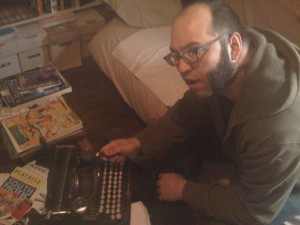Die by the Pen: You Wanna Know How I Script?
Every Wednesday, Jared Gniewek discusses what feeds his fires as an author of comics, screenplays and radio dramas.

You Wanna Know How I Script?
or It Almost Seems Like Real Magic When the Process Works.
I wrote a script last week. It was for an artist I met at the New York Comic Con and it is a horror story. I wanted to share a step by step process that I use to translate that loose cloud of cosmic dust and nerve endings into a cohesive piece and do it in a way that won’t destroy anyone’s brain.
The first thing I did was send the “plot points” to the artist to see if there was anything that wouldn’t work for him in the larger sense. It was basically a list of what would happen in what order. We exchanged emails as we hatched out what would and wouldn’t work for us. He had great suggestions that really took the idea I had to the next level. Never turn down advice, kids. Just ignore it if it doesn’t help. People can really surprise you and when you are in love with your “baby” you can and will miss opportunities to make it better.
The next step was a bit harder. I took the plot points and then I set up a loose structure, trying to figure out how many pages each sequence would take. It was for an eight page story, so economy of action was very important. I then limited myself to those parameters while scripting. I extended some sequences as necessary, but it’s a good idea when working on comic scripts to have an awareness of how you want the finished project to look and flow in its entirety. You can’t really improvise comic scripting… at least I can’t.
I then selected the scene I felt was the most crucial (the “money shot,” if you will) and full-scripted it after drawing roughs with stick figures. I found I didn’t have enough space to have a scene showing the killer take someone out and a scene of a guy warning the protagonist about the killer so I “cross cut” between the two scenes and continued the “warning” in narrative boxes during the action sequence. This did two things: it reinforced the POV of the protagonist as we are hearing what he’s hearing even in the scenes he’s not in; and it saved me about six “talking head” panels.
After the climax scene was finished, I went back to the start and began building tension. I tried using rhythms of speech and sound effects to pace the reader through the opening few scenes the way I wanted so the action would hit harder. While doing this, something struck me about the story and I had a perfect little “tag line” I could use to tie the whole thing together. That felt good and I wrote the final page in a whirl. Sometimes you don’t REALLY know what your story is about until you’re actually writing it. I discovered my story about tentacle monsters was really about love and loss and failing other people! Who knew?
So, I sent the script to the artist and he sent back his suggestions for the second draft. Right here is where most guys get irked. He sent back changes in the plot points. Remember the stuff in the first paragraph about that being the first thing you hatch out together? Remember that in a collaborative process not only is nothing immutable, but also that nothing should be. I read what he had to say and waited a few minutes to be able to look at it objectively, and you know what? He was right! The warning from a friend and the alien mind meld accomplished the same thing structurally and only one would be sufficient, which would open up more panels for the final show down. It was a win-win situation, would only take rewriting a little bit and we would both be happy! It was a perfect collaboration. Best of all, the nuts and bolts of my panel rhythms and compositional sense weren’t brought into question at all.
So now I’m plugging away on the second draft and he’s starting to draw up some images of the characters to share and soon enough, we’ll have an eight pager. It almost seems like real magic when the process works.
Jared Gniewek works in the music industry as a back line technician, performer, and promoter. He is also a freelance writer whose work can be seen in the recent re-launch of Tales from the Crypt and heard on The Dark Sense, an audio anthology of the macabre for which he is also the story editor — http://www.earstage.com/darksense.htm.



Fun and informative as always, Zod. It’s interesting how you’ve seemed to balance your posts between explaining both work and play. Not exactly an overt theme from what I can tell, but a great overreaching arc explaining the actual process perhaps?
Y’know what I love? Not only am I holding a shiv in the picture of me but there is a South Pacific playbill, an old comic with REVOLT of the SUPER PETS and a Leigh Brackett Science Fiction novel all within easy reach.